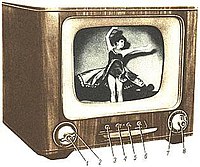
Photo from wikipedia
Due to the rise of the Internet, the effects of different science communication formats in which experts appear cannot be neglected in communication research. Through their emotional and more comprehensible… Click to show full abstract
Due to the rise of the Internet, the effects of different science communication formats in which experts appear cannot be neglected in communication research. Through their emotional and more comprehensible communication ‘sciencetubers’—who frequently differ from the stereotypical image of scientists as white, old men—may have a considerable effect on the public’s perceived trustworthiness of scientists as well as their trust in science. Thus, this study aims to extend trust and trustworthiness research to consider the role of emotion in science communication in the context of emerging online video content. Therefore, perceived trustworthiness was examined in an experimental online survey of 155 people aged 18–80. We considered different potential influencing variables for trustworthiness (expertise, integrity, benevolence) and used six different video stimuli about physics featuring scientific experts. The video stimuli varied according to format (TV interviews vs. YouTube videos), gender (male vs. female), and age of the experts depicted (old vs. young). The results suggest that: (1) Scientific experts appearing in TV interviews are perceived as more competent but not higher in integrity or benevolence than sciencetubers—while scientists interviewed on TV are regarded as typical scientists, sciencetubers stand out for their highly professional communication abilities (being entertaining and comprehensible); (2) these emotional assessments of scientists are important predictors of perceived trustworthiness; and (3) significantly mediate the effect of the stimulus (TV interview vs. YouTube video) on all dimensions of perceived trustworthiness of scientific experts.
Journal Title: Media and Communication
Year Published: 2020
Link to full text (if available)
Share on Social Media: Sign Up to like & get
recommendations!